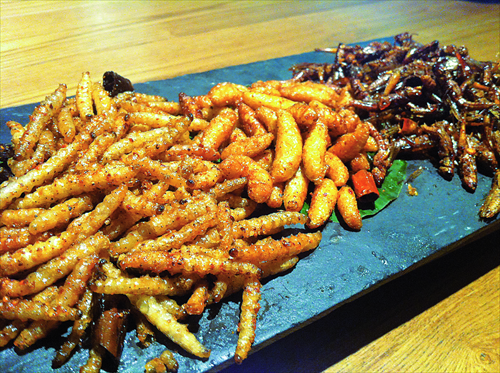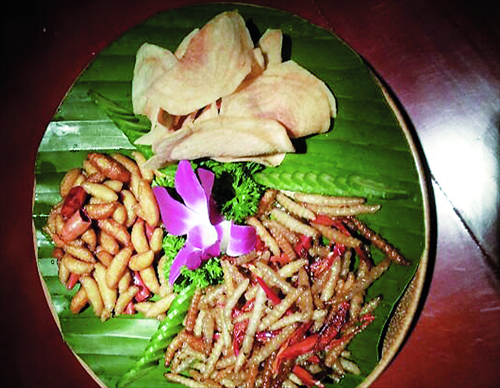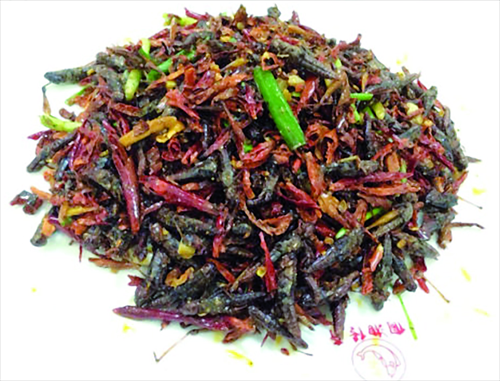Creepy crawly cuisine
The popular places in Shanghai for some insect ingestion
While China is famed for its colorful cuisine that encompasses such favorites as chicken feet and duck blood, its insect dishes are less well-known, but for many people equally bizarre. These include such hearty fare as locusts, stick insects and bee pupae, which are often deep-fried and seasoned.
As unpalatable as it may seem to some, insects are highly nutritious, and could soon become more of a regular feature in all of our diets.
In early 2013, the Food and Agriculture Organization of United Nations released a report listing more than 1,900 edible insects. The aim of the report was to encourage more people to take up insect-eating. The report pointed out that edible insects contain more protein and fewer calories than meat, making them a nutritious, healthy and sustainable food source for humans.
In China, eating insects has long been a tradition in some southwestern areas like Yunnan and Hunan provinces, where locals catch or even raise edible insects to make food, alcohol and medicine. In recent years, a few restaurants featuring such cuisine have opened in Shanghai, and have proven a hit with customers.
The Global Times has picked out three of the city's most popular restaurants with insect dishes that are the ideal place to get your teeth into some bugs for the first time.

The dish of kunchong ganji
Deep South Yunnan Ethnic Cuisine
After opening earlier this year at People's Square, Deep South Yunnan Ethnic Cuisine soon became popular for its typical take on sour and hot Yunnan food.
One of its specialties is kunchong ganji (literally an insects' gathering), which consists of three deep-fried insects: stick insects, honeybee pupae, and locusts.
All the insects are transported to Shanghai alive from Yunnan Province by air. "Every morning we get the newly arrived insect packages at the airport, and we won't kill the insects until someone orders the dish," said a restaurant staffer, pointing at the kunchong ganji dish that the Global Times had just ordered. "Thirty minutes ago the insects were still alive."
The deep-fried insects are neatly placed in three stacks on delicate stone plates. The left stack is made up of the 2-centimeter-long stick insects, which look like mini-sized silkworms in appearance. They taste oily and a little bitter.
In the middle of the plate is a stack of honeybee pupae. Deep-fried pupae are firm and springy, and taste like egg yolk and peanuts. Next to the pupae are the locusts that, despite their off-putting appearance, are the tastiest of the three offerings.
Just close your eyes and throw one into your mouth, and then enjoy its special taste that is similar to dried small, shelled shrimp with a fresh bamboo aroma.
Address: 5/F, Bailian Shimao International Plaza, 819 Nanjing Road East 南京东路819号百联世茂商场5楼
Price: 68 yuan ($10.69) per dish

The dish of three pupa
Guyi Yunnan Restaurant
The raw materials of the restaurant's most popular bee pupa dish are transported from the restaurant owner Zhao's hometown in Yunnan Province.
"People in my hometown like to eat insects very much, and sometimes we even eat uncooked stick insects and bee pupae," Zhao told the Global Times, adding that raw pupae taste sweet, while the fried ones taste salty.
Every day, the restaurant sells nearly 20 servings of its specialty "three pupa cuisine," which contains three kinds of deep-fried bee pupae. However, most people are still reluctant to try it.
"Seeing the dish on the menu, some customers are astonished, some are scared, and some tell me directly that they are disgusted," Zhao said.
But those who are willing to try may find they develop a taste for the deep-fried pupae that are crisp outside and tender inside, and have a pleasant cheese-like flavor.
Address: 1705 Xinzha Road 新闸路1705号
Price: 168 yuan per dish

The dish of hot and spicy locusts
Dongxiang Legend
This restaurant serves its guests with special Dong cuisine that is not often seen in Shanghai. Dong is an ethnic minority group mainly located in the mountains of southwestern Hunan and Guizhou provinces, where locals like to hunt their own food, including snakes and insects.
Restaurant owner Long is a Dong native from Hunan Province. He told the Global Times that their specialty "hot and spicy locusts" sells quite well.
"I hired some men back in my hometown who catch wild locusts for me every day," he said, adding that raising locusts is quite difficult. "The live locusts are transported from Hunan directly to Shanghai, and after that we deep-fry them to make the dish."
As well as tasting the original Dong flavor, customers can also enjoy traditional Dong-style singing and dancing performances at the restaurant every Tuesday, Thursday and Saturday.
Address: 497 Sanmen Road 三门路497号
Price: 68 yuan per dish
Wang Beibei contributed to this story